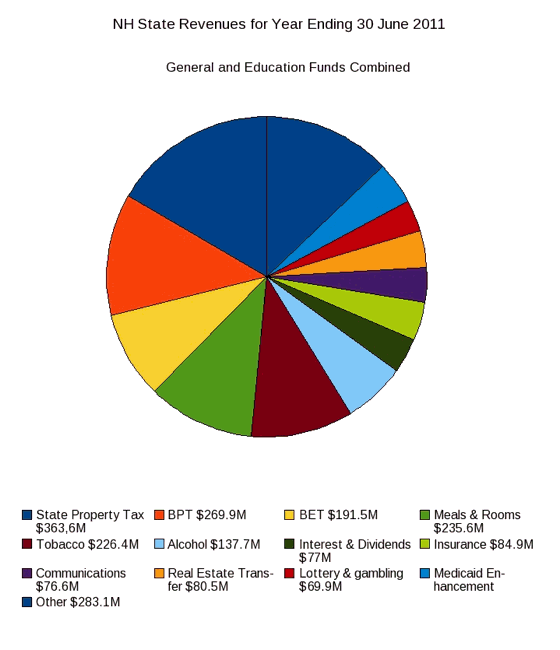This article gives a brief summary of the major revenue sources along with commentary on some of their key attributes. You will notice that this list is long and diverse. No one item accounts for more than 15% of total revenues. This gives New Hampshire resilience during shifts in the economic climate. For example, FY2011 saw substantial declines in revenue from the Interest and Dividends Tax and the Real Estate Transfer Tax which were partially offset by increases in revenue from the Insurance Tax and Securities Revenue.
The State Property Tax ($363.6M) is used to fund education grants to school districts for K-12. For most school districts it acts the same as the local property tax but with a different name.
Business Profits Tax ($269.9M) is an 8.5% tax on business profits. BPT can fluctuate substantially along with the economy. The NH BPT is higher than the Massachusetts profits tax and so tends to discourage businesses from locating in New Hampshire.
Business Enterprise Tax (BET, $191.5M) is a .75% tax on the total of compensation, interest and dividends paid by the business in New Hampshire. BET tends to be much more stable than BPT from year to year.
Meals and Rentals Tax ($235.6M) is a 9% tax on prepared meals, hotel room rentals and motor vehicle rentals. Much of the revenue from this tax comes from visitors who cannot vote here. As tourism is an important part of our economy, we would be wise to keep this tax low enough to keep those visitors coming.
Tobacco Tax ($226.4M) applies to tobacco products sold in New Hampshire. A significant portion of this tax is paid by residents of neighboring states who come here to buy lower-cost tobacco products. Recently, the NH Legislature has been working on better understanding how changes in this tax influence retail traffic and spending in border towns. Since visitors from neighboring states who come to buy tobacco may also buy other products, retailers along the border want the New Hampshire tax on tobacco to be significantly below tax rates across the border. They claim there will be some tax rate, lower than our neighbors’, that maximizes tax revenue and economic benefit. They are probably right.
Alcohol Revenue ($137.7M) includes transfers from the Liquor Commission plus the beer tax. The Liquor Commission operates the NH State Liquor Stores.
Interest and Dividends Tax ($77M) is a 5% tax on interest and dividends received by NH residents. Federal Reserve actions to lower interest rates have caused this tax to yield less revenue.
Insurance Tax ($84.9M) is a tax on insurance premiums collected from insurance companies that sell insurance in New Hampshire. Most or all of this tax is passed on to consumers in New Hampshire.
Communications Tax ($76.6M) applies to telephone and internet services.
Real Estate Transfer Tax ($80.5) is a 1.5% tax on real estate sales and other transfers, mostly collected when the transfer is recorded at the registry. Revenues from this tax tend to fluctuate with the level of activity in the real estate market and have been down for the past few years.
Net Medicaid Enhancement Revenue ($93.4M)
Lottery, Racing, and gambling-related taxes and transfers ($69.9M) is primarily transfers from the Lottery Commission.
Other ($283.1M) includes more than ten other revenue sources, from court fines, to securities revenue, to the tobacco settlement.
Sources of information: Tax rates from State of NH websites
Revenue amounts from “NH Revenue Focus June FY 2011” unaudited.

